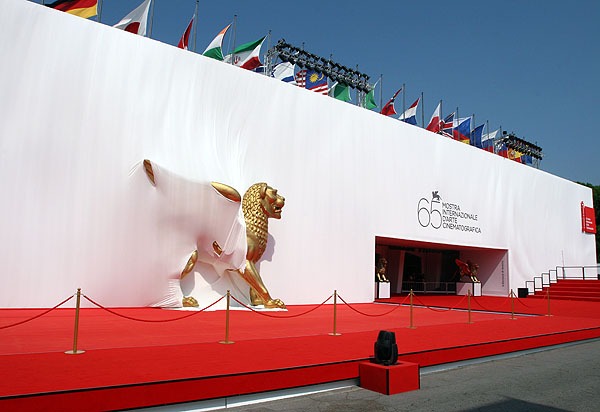The Golden Lion at Venice: How This Iconic Award Shapes the Future of Global Cinema

The Golden Lion award at Venice Film Festival transforms directors' careers and influences cinema's future directions. As the world's oldest film festival honor, it elevates films from festival spotlight to mainstream recognition, often predicting Oscar success and amplifying global voices in filmmaking. You'll discover how winners like Antonioni, Tarkovsky, and Lee redefined cinematic language while maneuvering the award's complex political ecosystem. The lion's roar echoes far beyond the Venetian canals.
Key Takeaways
- The Golden Lion propels filmmakers into international prominence while elevating their films' commercial prospects and critical recognition.
- Venice Film Festival serves as the first prestigious stop in the annual awards season pipeline, often predicting Oscar success.
- Winners like Antonioni, Tarkovsky, and Lee have historically redefined cinematic language and influenced future generations of filmmakers.
- The award connects Venice's cultural heritage with contemporary global cinema through its symbolic lion imagery and prestigious history.
- Despite controversies over selection bias, Golden Lion winners typically represent innovative approaches to storytelling and visual aesthetics.
The Golden Lion at Venice: How This Iconic Award Shapes the Future of Global Cinema
Prestige radiates from the Golden Lion, Venice Film Festival's highest honor that transcends mere recognition to become a powerful industry catalyst. When you witness a film crowned as Best Film by Venice's international jury, you're seeing more than a trophy exchange—you're watching cinema's future unfold.
The Golden Lion isn't just a prestigious award; it's a transformative force that elevates a director's career while reshaping global cinema's landscape. Films like "The Shape of Water" demonstrate how this recognition propels works from festival spotlight to mainstream awards season success, including Academy Awards.
The jury's decision ripples through critical reception and commercial success channels, influencing which cinematic voices gain prominence. While the Golden Lion celebrates Venice's finest, the Cannes Film Festival has honored its own cinematic treasures like Pulp Fiction (1994), which caused an international sensation and completely changed how films are made and watched. This coveted golden statue continues to define excellence and signal which films deserve your attention in an increasingly crowded media landscape.
The Storied History of Cinema's Oldest Festival Trophy
When you visit the Palazzo del Cinema today, you're walking through the same halls where Count Giuseppe Volpi, the festival's founder, established this prestigious tradition. The Venice City Council officially adopted the lion symbol from the city's coat of arms, transforming it into cinema's most historic honor.
Throughout decades, saying a director "won the Golden Lion" has signified the pinnacle of artistic achievement. As the top prize at the oldest film festival in the world, the Golden Lion continues to represent both cinematic excellence and Venetian heritage. Well before this award was created, the first nickelodeon opened in Pittsburgh in 1905, marking the beginning of dedicated motion picture theaters in America.
Golden Lion Winners Who Redefined Cinema
Masters of innovation, the Golden Lion winners have consistently pushed cinema's boundaries far beyond conventional storytelling. When you explore the visionaries honored at Venice, you'll discover how directors like Michelangelo Antonioni, Andrei Tarkovsky, and Luchino Visconti transformed film language itself, creating works that challenge and inspire.
Werner Herzog's "Nosferatu the Vampyre" reinvented horror with atmospheric dread rather than cheap scares. Ang Lee's "Crouching Tiger, Hidden Dragon" elevated martial arts films to poetic art. Auteurs like Hou Hsiao-hsien and Aleksandr Sokurov introduced new visual grammars that influenced generations. Asghar Farhadi's nuanced storytelling brought global attention to Iranian cinema's rich tradition.
These filmmakers didn't just win awards—they fundamentally altered the way one comprehends the possibilities of cinema. Like the directors of the French New Wave movement, these Golden Lion recipients embraced innovative techniques such as nonlinear narratives and experimental storytelling approaches that continue to ripple through contemporary filmmaking.
From Venice to Oscar: The Awards Season Pipeline
The Golden Lion serves as a powerful harbinger for Oscar success, establishing Venice as the first major stop in cinema's annual awards marathon. You'll notice films like Guillermo del Toro's "The Shape of Water" leveraging their Venice Film Festival acclaim to propel their Oscar campaigns forward.
Venice's unique ability to spotlight emerging talent, particularly the "Three Amigos" of Mexican directors, creates a critical pathway for films seeking Academy recognition. While a Golden Lion doesn't guarantee Oscar gold—as "Nocturnal Animals" discovered—the festival's prestigious platform and high-profile juries substantially influence a film's trajectory.
When you track Best Director, Best Actress, and other major category winners from Venice, you're witnessing the earliest indicators of awards season frontrunners that often maintain their momentum through critical acclaim all the way to the Oscars. The festival often celebrates films that represent the kind of New Hollywood movement that revolutionized American cinema by pushing creative boundaries and embracing innovative narratives.
Breaking Boundaries: How the Golden Lion Elevates Global Voices
Beyond awards season predictions, the Golden Lion stands as a transformative force in global cinema, breaking barriers for filmmakers from diverse backgrounds and national traditions. When you examine its impact on global voices, you'll discover how this prestigious award creates lasting change in the industry.
The Golden Lion offers career-defining recognition that transforms filmmakers from underrepresented backgrounds into international contenders. Winners gain immediate visibility and access to funding opportunities previously unavailable to them.
The award's celebration of diverse national cinemas helps redefine what "prestigious cinema" means globally. By embracing innovative forms of storytelling like VR, the festival continues pushing the boundaries of what cinema can be.

Pedro Almodóvar's Journey to Golden Lion Glory
Pedro Almodóvar's decades-long cinematic journey reached its apex at the 2022 Venice Film Festival, where "The Room Next Door" captured the coveted Golden Lion award. This prestigious award marked the Spanish director's first Golden Lion for a feature film, though he'd previously won Venice's best screenplay honor in 1988.
You'll notice that despite being his first English-language feature, Almodóvar maintained what he called the "Spanish spirit" in his acceptance speech. Starring Tilda Swinton and Julianne Moore, this death-with-dignity drama showcases the auteur's mastery of thought-provoking cinema that resonated deeply with the jury.
The Golden Lion solidifies Almodóvar's status among cinema's most influential voices. As a two-time Academy Award winner, this recognition further cements his legacy as a revered filmmaker whose work transcends cultural boundaries.
The Festival's Impact on Independent Filmmaking
Almodóvar's triumph represents just one story among countless directors whose careers have been transformed by Venice's prestigious Golden Lion. When you examine the festival's influence on independent filmmaking, you'll find it's revolutionized global cinema by valuing artistic merit over commercial appeal.
The Golden Lion empowers filmmakers in four critical ways:
- Encourages boundary-pushing work that takes creative risks, often resulting in groundbreaking socially-conscious films
- Provides international stage visibility that helps independent projects transcend cultural barriers
- Opens doors to funding and distribution opportunities previously inaccessible to independent directors
- Cultivates a diverse film community where critical acclaim flows naturally from authentic storytelling
This prestigious recognition doesn't just celebrate filmmakers—it grants them creative freedom to shape cinema's future.
Jury Politics and Selection Controversies
While the Golden Lion stands as a symbol of artistic excellence, the jury's decisions often spark heated debates within the film community. You'll notice that selection controversies arise when awards don't align with critical favorites, raising questions about the objectivity of the process.
The jury's composition, handpicked by festival leadership, wields significant influence over which films receive recognition. Biases related to nationality and precedent have been suspected of swaying decisions, creating a complex political ecosystem around what should be a merit-based evaluation.
Some controversies stem from allegations that ideologies and political agendas infiltrate the selection process. When a surprising winner takes home the Golden Lion, industry insiders often scrutinize the jury's motivations, wondering whether artistic achievement truly triumphed over other influencing factors.
The Golden Lion's Influence on Film Distribution and Audience Reach
Beyond the jury room debates, the Golden Lion's impact extends far into the commercial domain of cinema. When Alberto Barbera announces the winner at Venice, you'll witness an immediate transformation in that film's market potential.
- Box office boost - Golden Lion winners typically see a 40-60% increase in ticket sales compared to pre-award projections
- Distribution deals - Films like those featuring Nicole Kidman secure international distribution contracts within days of winning
- Festival circuit momentum - Winners often leverage their success to secure screenings at other European film festivals
- Streaming platform bidding wars - Grand Jury Prize and Best Actress award recipients attract premium offers from global streaming services
You're watching more than just an artistic accolade—the Golden Lion effectively repositions films in the competitive landscape of global cinema distribution.
Gorup de Besanez, Omar Sharif 02, CC BY-SA 3.0
Mnasiri7 photo: Mansour Nasiri, 65th venice film festival, CC BY-SA 3.0




